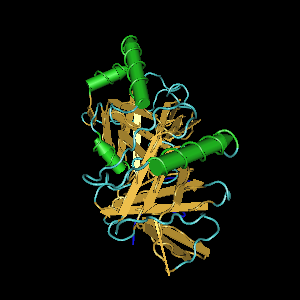POT1
POT1 (Protection of Telomeres 1) is a protein that in humans is encoded by the POT1 gene. POT1 is a critical component of the telomere protein complex, which functions in the protection and maintenance of chromosome ends. The protein plays a significant role in telomere length regulation and telomere end protection, preventing the DNA damage response from recognizing telomeres as sites of DNA damage. By binding to the single-stranded DNA (ssDNA) overhang at the telomere, POT1 prevents inappropriate homologous recombination and non-homologous end joining (NHEJ), mechanisms that could lead to chromosomal instability.
Function[edit | edit source]
POT1 is part of the shelterin complex, a critical component in telomere maintenance and function. The shelterin complex also includes TRF1, TRF2, TIN2, RAP1, and TPP1, which together protect telomeres from being recognized as DNA damage and regulate telomere length. POT1 specifically binds to the single-stranded overhang of the telomere, playing a key role in protecting the telomere ends and regulating telomere length by modulating the activity of telomerase, an enzyme responsible for adding DNA sequence repeats ("TTAGGG" in humans) to the end of DNA strands in the telomere regions.
Clinical Significance[edit | edit source]
Mutations in the POT1 gene have been associated with various forms of cancer, including melanoma, glioma, and familial chronic lymphocytic leukemia (CLL). These mutations can lead to altered telomere length regulation and telomere protection, contributing to genomic instability, a hallmark of cancer. Furthermore, POT1 mutations have been implicated in telomere syndromes, which are characterized by premature aging and increased susceptibility to cancer.
Research Directions[edit | edit source]
Research on POT1 continues to explore its role in telomere maintenance, its interaction with other components of the shelterin complex, and its involvement in the cellular response to DNA damage. Understanding the molecular mechanisms by which POT1 mutations contribute to cancer and telomere syndromes may lead to the development of novel therapeutic strategies targeting telomere maintenance mechanisms.
Search WikiMD
Ad.Tired of being Overweight? Try W8MD's physician weight loss program.
Semaglutide (Ozempic / Wegovy and Tirzepatide (Mounjaro / Zepbound) available.
Advertise on WikiMD
|
WikiMD's Wellness Encyclopedia |
| Let Food Be Thy Medicine Medicine Thy Food - Hippocrates |
Translate this page: - East Asian
中文,
日本,
한국어,
South Asian
हिन्दी,
தமிழ்,
తెలుగు,
Urdu,
ಕನ್ನಡ,
Southeast Asian
Indonesian,
Vietnamese,
Thai,
မြန်မာဘာသာ,
বাংলা
European
español,
Deutsch,
français,
Greek,
português do Brasil,
polski,
română,
русский,
Nederlands,
norsk,
svenska,
suomi,
Italian
Middle Eastern & African
عربى,
Turkish,
Persian,
Hebrew,
Afrikaans,
isiZulu,
Kiswahili,
Other
Bulgarian,
Hungarian,
Czech,
Swedish,
മലയാളം,
मराठी,
ਪੰਜਾਬੀ,
ગુજરાતી,
Portuguese,
Ukrainian
Medical Disclaimer: WikiMD is not a substitute for professional medical advice. The information on WikiMD is provided as an information resource only, may be incorrect, outdated or misleading, and is not to be used or relied on for any diagnostic or treatment purposes. Please consult your health care provider before making any healthcare decisions or for guidance about a specific medical condition. WikiMD expressly disclaims responsibility, and shall have no liability, for any damages, loss, injury, or liability whatsoever suffered as a result of your reliance on the information contained in this site. By visiting this site you agree to the foregoing terms and conditions, which may from time to time be changed or supplemented by WikiMD. If you do not agree to the foregoing terms and conditions, you should not enter or use this site. See full disclaimer.
Credits:Most images are courtesy of Wikimedia commons, and templates, categories Wikipedia, licensed under CC BY SA or similar.
Contributors: Prab R. Tumpati, MD

